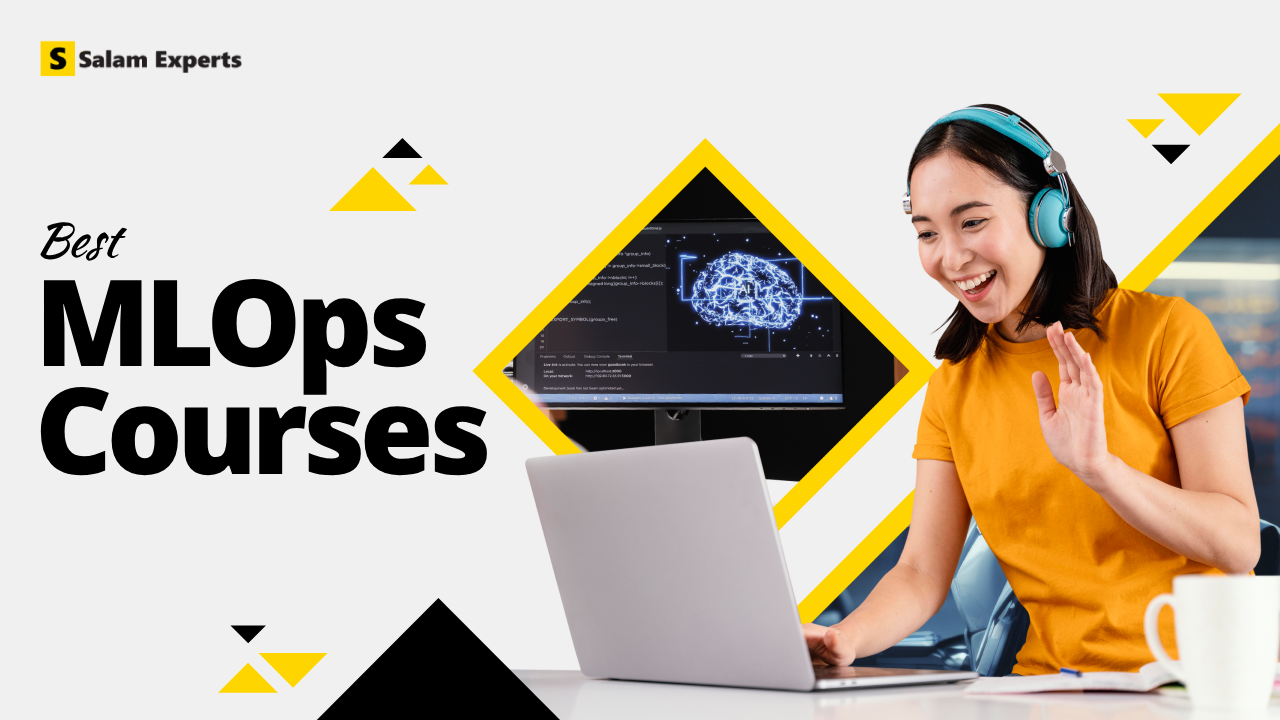10 Best MLOps Courses to Learn Machine Learning

The world of machine learning is booming, and with it comes the need for efficient and reliable ways to deploy and manage models in real-world scenarios. Enter MLOps, the bridge between data science and operations, ensuring your brilliant models don’t just gather dust but make a difference.
Choosing the right course is crucial if you’re ready to take your ML skills to the next level and become an MLOps pro. This guide will help you navigate the landscape of MLOps education and find the perfect fit for your needs.
Key Points:
- MLOps bridges the gap between data science and operations.
- Choosing the right MLOps course depends on your skill level and goals.
- Free and paid options are available, each with its advantages.
- This guide explores 10 top-rated MLOps courses to help you get started.
What are MLOps Courses?
MLOps courses equip you with the knowledge and skills to streamline the entire machine learning lifecycle, from model development and training to deployment, monitoring, and continuous improvement. They cover topics like:
- Version control and reproducibility.
- Automation and CI/CD pipelines.
- Model deployment and serving.
- Monitoring and logging.
- Scaling and infrastructure management.
- MLOps tools and platforms.
Top 10 MLOps Courses:
Here are 10 of the best MLOps courses available, catering to different learning styles and experience levels:
1. Machine Learning Engineering for Production (MLOps) Specialization
- Overview: This comprehensive specialization on Coursera, taught by Andrew Ng and other experts from Google, dives deep into building production-ready ML systems. You’ll learn about data pipelines, model management, deployment strategies, and best practices for MLOps.
- Author/Instructor: Andrew Ng, Laurence Moroney, Robert Crowe (Google)
- Why to trust: Offered by deeplearning.ai, a renowned platform for AI education, and taught by leading experts in the field.
- Pros:
- In-depth content.
- Hands-on projects.
- Industry-relevant skills.
- Certificate upon completion.
- Cons:
- Requires prior knowledge of TensorFlow
- Requires prior knowledge of Python.
- Note: A paid subscription is required for Coursera.
User Review: As a machine learning enthusiast who’s delved into several MLOps courses, I’d like to share my personal experiences and insights about the course, As the in-depth coverage and focus on production-ready ML systems were incredibly valuable. Andrew Ng’s expertise is evident, and the hands-on projects significantly enhanced my understanding. However, the course does expect prior knowledge of TensorFlow and Python, which could be a hurdle for complete beginners.
2. Made With ML MLOps Course
- Overview: This open-source course by Goku Mohandas provides a comprehensive guide to building end-to-end ML systems. It covers ML fundamentals, deployment strategies, testing, monitoring, and best practices for software engineering in MLOps.
- Author/Instructor: Goku Mohandas
- Why trust: Highly regarded within the ML community, with over 30,000 stars on GitHub.
- Pros:
- Free.
- Comprehensive.
- Practical projects.
- Strong community support.
- Cons:
- Requires self-motivation.
- Independent learning.
- Note: It is for Free
User Review: As a machine learning enthusiast who’s delved into several MLOps courses, I have analyzed this course and can surely say that Goku Mohandas’ passion for MLOps is truly inspiring! The course structure, practical projects, and emphasis on software engineering best practices were exceptional. A bonus is that it’s completely free and open-source! However, the self-paced nature requires discipline and the ability to learn independently.
3. MLOps | Machine Learning Operations Specialization (Microsoft)
- Overview: This specialization Course focuses on using Microsoft Azure for MLOps tasks. You’ll learn about data analysis, Python programming, cloud computing, and MLOps tools like Azure ML and MLflow.
- Author/Instructor: Microsoft
- Why to trust: Offered by Microsoft, a leader in cloud computing and AI technologies.
- Pros:
- Azure-specific skills.
- Industry-relevant.
- Certificate upon completion.
- Cons:
- Focuses primarily on the Microsoft Azure platform.
- Note: A paid subscription is required for Coursera.
- Platforms: Coursera
User Review: As a machine learning enthusiast who’s delved into several MLOps courses, I’d like to say that This specialization provides a strong foundation in MLOps concepts and tools, focusing on the Microsoft Azure ecosystem. It’s ideal for those aiming to specialize in Azure MLOps. The downside is that the Azure-centric approach may need to be revised for those working with different cloud platforms.
4. MLOps for Beginners (Udemy)
- Overview: This beginner-friendly course on Udemy provides an introduction to MLOps concepts and tools. You’ll learn about the MLOps lifecycle, automation, deployment, monitoring, and best practices.
- Author/Instructor: Prem Naraindas
- Why to trust: Created by an experienced MLOps practitioner and well-rated on Udemy.
- Pros:
- Affordable.
- Beginner-friendly.
- Hands-on exercises.
- Cons:
- Less in-depth than some other options.
- Note: It varies depending on Udemy promotions.
- Platforms: Udemy
User Review: As a machine learning enthusiast who’s delved into several MLOps courses, I’d like to share my personal experience on the analysis of this course As a beginner-friendly course, it effectively introduces core MLOps concepts and tools. The affordability and hands-on exercises make it a great starting point. That being said, the content depth might feel limited compared to other options for those seeking more advanced topics.
5. Python Essentials for MLOps (IBM)
- Overview: This course on Coursera focuses on the Python skills needed for MLOps. You’ll learn about data types, functions, modules, testing, and working with datasets using Pandas and NumPy.
- Author/Instructor: IBM
- Why to trust: Offered by IBM, a leader in technology and AI solutions.
- Pros:
- Focuses on essential Python skills.
- Practical exercises.
- Certificate upon completion.
- Cons:
- Does not cover MLOps concepts in detail.
- Note: A paid subscription is required for Coursera.
User Review: This course excels at building a strong foundation in Python for data science and MLOps. The practical exercises and IBM’s reputation add to its credibility. The downside is that the course primarily focuses on Python skills and doesn’t delve deeply into MLOps concepts and practices.
If you want to Level up your MLOps skills and validate your knowledge cost-free, then you can check Google’s free comprehensive certification courses.
6. MLOps Zoomcamp
- Overview: This free online course offers a comprehensive introduction to MLOps, covering topics from data versioning and experiment tracking to model deployment and monitoring.
- Author/Instructor: Alexey Grigorev
- Why to trust: Created by a respected data scientist and well-received by the community.
- Pros:
- Free, practical projects.
- Covers a wide range of MLOps topics.
- Cons:
- Requires self-motivation and independent learning.
- Note: It is Available for Free
User Review: This free online course offers a well-structured introduction to MLOps, covering a broad range of topics and practical projects. The live sessions and community aspect add value. However, the fast pace might be challenging for some learners, and self-discipline is required to complete the course.
7. Practical MLOps (fast.ai)
- Overview: This course focuses on the practical aspects of MLOps, using real-world examples and case studies. You’ll learn about building and deploying ML models in production, with a focus on efficiency and best practices.
- Author/Instructor: fast.ai team
- Why to trust: Created by a respected organization known for its practical approach to deep learning.
- Pros:
- Practical, hands-on.
- Focuses on real-world applications.
- Cons:
- Requires some prior knowledge of machine learning and deep learning.
- Note: Free
User Review: The course’s emphasis on practical applications and real-world case studies is highly beneficial. It equips learners with the skills to build and deploy ML models efficiently. It’s recommended to have some prior knowledge of machine learning and deep learning to fully grasp the content.
8. Full Stack Deep Learning
- Overview: This course covers the entire deep learning project lifecycle, including MLOps principles and practices. You’ll learn about data management, model training, deployment, and monitoring.
- Author/Instructor: University of California, Berkeley
- Why to trust: Developed by a renowned university and taught by experienced instructors.
- Pros:
- Comprehensive.
- Covers both deep learning and MLOps.
- Practical projects.
- Cons:
- Requires some prior knowledge of machine learning and deep learning.
- Note: It is Available for Free.
User Review: This comprehensive course covers the entire deep learning project lifecycle, including MLOps principles and best practices. The practical projects and focus on real-world applications are valuable. The course does require some foundational knowledge in machine learning and deep learning, which might be challenging for beginners.
9. MLOps Engineering on AWS (Amazon)
- Overview: This course focuses on using Amazon Web Services (AWS) for MLOps tasks. You’ll learn about building and deploying ML models on AWS, using services like SageMaker, Lambda, and CloudWatch.
- Author/Instructor: Amazon Web Services
- Why to trust: Offered by Amazon, a leader in cloud computing and AI technologies.
- Pros:
- AWS-specific skills.
- Industry-relevant.
- Practical projects.
- Cons:
- Focuses primarily on the AWS platform.
- Note: Varies depending on the specific course or learning path.
User Review: This course provides a solid understanding of using AWS for MLOps tasks. It covers various AWS services and equips learners with practical skills for building and deploying ML models on the platform. The focus on AWS might limit its applicability for those working with other cloud platforms.
10. Azure Machine Learning Engineer Associate Certification (Microsoft)
- Overview: This certification program validates your skills in designing and implementing MLOps solutions on Azure. You’ll learn about data preparation, model training, deployment, and monitoring using Azure Machine Learning.
- Author/Instructor: Microsoft
- Why to trust: Offered by Microsoft, a leader in cloud computing and AI technologies.
- Pros:
- Industry-recognized certification.
- Validates Azure MLOps skills.
- Comprehensive preparation materials are available.
- Cons:
- Requires passing an exam.
- Focuses primarily on the Azure platform.
- Note: Exam fee applies.
User Review: This certification program offers a structured path to validate your Azure MLOps skills and gain industry recognition. The comprehensive preparation materials and focus on real-world scenarios are beneficial. The certification requires passing an exam, which might be challenging for some learners. Additionally, the Azure-specific focus might limit its broader applicability.
Conclusion
Choosing the best MLOps course depends on your individual needs and goals. Consider your current skill level, preferred learning style, and budget when making your decision. With the variety of options available, you’ll find the perfect course to launch your MLOps journey and take your machine learning skills to the next level.
Disclaimer:
The information provided in this blog post is for general knowledge and informational purposes only and does not constitute professional advice. It is essential to conduct your own research and due diligence before making any decisions related to MLOps courses or certifications.
Author
-

We are a digital marketing agency with over 17 years of experience and a proven track record of helping businesses succeed. Our expertise spans businesses of all sizes, enabling them to grow their online presence and connect with new customers effectively.
View all posts
In addition to offering services like consulting, SEO, social media marketing, web design, and web development, we pride ourselves on conducting thorough research on top companies and various industries. We compile this research into actionable insights and share it with our readers, providing valuable information in one convenient place rather than requiring them to visit multiple websites.
As a team of passionate and experienced digital marketers, we are committed to helping businesses thrive and empowering our readers with knowledge and strategies for success.




